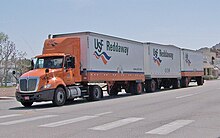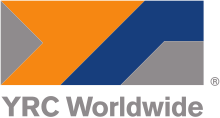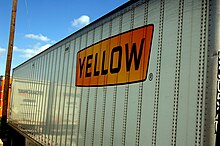Yellow Corporation
 | |
 Yellow corporate headquarters | |
| Formerly |
|
|---|---|
| Type | Public |
| |
| Industry | Transportation |
| Founded | 1929 |
| Founders |
|
| Headquarters | Overland Park, Kansas, USA |
Area served | North America |
Key people | Darren Hawkins (CEO) |
| Revenue | |
| Total assets | |
| Total equity | |
Number of employees | 19,000 (2017) |
| Subsidiaries | |
| Website | myyellow |
| Footnotes / references [1][2][3] | |
Yellow Corporation is an American transportation holding company headquartered in Overland Park, Kansas. Its subsidiaries include national less than truckload (LTL) carrier YRC Freight, regional LTL carriers New Penn, Holland and Reddaway and freight brokerage HNRY Logistics.[4] From 2006 to February 2021, Yellow was known as YRC Worldwide.[5]
History[]
Foundation and early history[]

This section needs additional citations for verification. (October 2021) |
In 1906, Grover Cleveland “Cleve” Harrell (1884–1942) started what was to become the Yellow Cab Company with a horse-drawn hack and a team of horses in Oklahoma City. After a year, he bought a Model T Ford. People were willing to pay more to ride in an automobile. After World War I, he bought two more cars and hired a relief driver. In 1918, Harrell painted one of his cars yellow. Although ridiculed by other cab drivers, he was hauling more passengers than anyone else, so he painted all his cars yellow and business boomed. Harrell trademarked the name Yellow Cab in Oklahoma. Later, John Hertz copied the Yellow Cab in Chicago and obtained the national trademark for the use of the name.
Harrell’s older brother, A. J. Harrell (1883–1972), had followed him to Oklahoma City and had been successful in the operation of a horse and mule business during World War I. Cleve needed extra capital for expansion, so he formed a partnership with A. J. The company’s offices were moved to 113 S. Santa Fe, and their younger brother, Marvin Harrell, and their father, Jake Harrell, were added to the payroll. The partnership started a cross-country bus line connecting Oklahoma City and Tulsa, which was later sold to Pickwick Bus Company of Tulsa. Cleve established the Capital Hill Bus Lines for the southern part of Oklahoma City, which he successfully operated for several months before selling it to the Oklahoma Street Railway Company.
When oil was discovered in the Oklahoma City area, mules were needed for work in digging slush pits, so the Harrell brothers bought mules and, in 1929, established the Yellow Transit Freight Lines to serve small manufacturers for whom freight was slow and express rates were prohibitive. By 1933, with the New Deal and the NRA, most businesses came under government regulation in an attempt to increase employment. Cleve, together with taxicab operators from other parts of the country, met in Washington, D.C. to formulate a regulatory code, which didn’t succeed. Cleve then devised his own code and got government confirmation.
About this time, the Harrell brothers dissolved the partnership. Cleve took the taxicabs in the trade-out, as well as the Yellow Cab Dynamic Gasoline Company. He sold the taxicab business in 1940 to Eddie Fuller, who operated the Y and Y Cab Co., and maintained ownership of the gasoline company until his death on December 3, 1942. A. J. took control of the freight lines, which he operated for many years. The company remained small until 1952, when an ownership group led by George E. Powell, Sr. bought the freight company. During this time, Yellow helped pioneer the concept of consolidating small freight shipments into trailer loads.
In 1968, the company name was changed from Yellow Transit Freight Lines to Yellow Freight System Inc. During the deregulation of interstate trucking in the 1980s, Yellow Freight System embarked on a massive restructuring by creating new distribution centers across the country to better serve customers. The company changed its name to Yellow Corporation in 1992, when it created a parent company, with Yellow Transportation, Inc. as its largest division.
Roadway Corp. acquisition[]

In December 2003 Yellow Corp., at the time the second largest LTL carrier in the US, acquired the largest, Roadway Corp., for US$1.05 billion.[6][7] Roadway had been spun off from its former parent, holding company Roadway Services Inc. (RSI), in 1995 and operated as an independent, publicly traded company since then. The purchase included Roadway's national operation, Roadway Express, northeast regional LTL subsidiary, New Penn, and Canadian LTL operation, Reimer Express. A new holding company, Yellow Roadway Corporation, was formed based at Yellow's headquarters in Overland Park to serve as the parent company for both Roadway Corp. and Yellow Corp.[8]
The purchase announcement came less than a year after the bankruptcy of the nation's then-third largest LTL carrier, Consolidated Freightways,[9] meaning the Yellow-Roadway merger would leave the industry with a major gap from Yellow Roadway's estimated over US$6 billion in revenue to FedEx Freight and Con-way, both around US$2 billion, followed by Overnite Transportation and Arkansas Best both around US$1.3 billion. All but Yellow Roadway and Arkansas Best were non-union.[10] The deal was therefore subject to heightened regulatory and union scrutiny.[8] As expected, the merger's financial impact was significant. Yellow Corp. posted a 2003 revenue of $3.07 billion, and Yellow Roadway Corp. had a 2004 revenue of $6.8 billion.[11]
USF acquisition[]

Just a few years after the Roadway merger, the company made another significant acquisition in 2005 with the US$1.5 billion[12] acquisition of Chicago, Illinois-based LTL carrier USF Corp. and its subsidiaries.[13] This brought Yellow Roadway's revenue to a high of $9.9 billion in 2006[14] with associated profit increases from $40 million in 2003 to $184 million in 2004 to a high of $288 million in 2005.[11][15] USF had experienced financial troubles prior to the acquisition but had still reported over US$2.3 billion in revenue in each of the two prior years.[16][17]
With the USF acquisition, Yellow Roadway restructured itself forming a new subsidiary, YRC Regional Transportation, headquartered in Roadway's home town of Akron, Ohio. This new group replaced former New Penn and Roadway Express parent, Roadway Group. Roadway Express would now be a direct subsidiary of Yellow Roadway. New Penn would be part of the new regional group which would also include USF subsidiaries[18] USF Holland, USF Reddaway, USF Dugan, and USF Bestway. It also included USF Glen Moore, USF's truckload unit. The operations of USF Logistics were absorbed into Yellow Roadway's logistics unit, Meridian IQ.[19]
Yellow Roadway also made forays into the international market, particularly China, expanding beyond its existing Canadian operations through Reimer. In September 2005, the company purchased half of Chinese freight-forwarding company JHJ International Transportation Co. Ltd.[14] and in August 2008, bought a 65 percent share of Chinese Shanghai Jiayu Logistics Co.[20]
As YRC Worldwide[]

Following these international investments, Yellow Roadway Corp., the parent company of Roadway, Yellow, and other subsidiaries, changed its name to YRC Worldwide in 2006.[5]
YRC reported a net loss of $974 million for its 2008 fiscal year.[21] In 2009 it again reported a net loss of $622 million.[22] Towards the end of 2009, YRC narrowly averted having to file for bankruptcy protection by successfully persuading its bondholders to exchange their $470 million in bond notes for roughly 94% of the company’s shares.[23] Concurrent with more recent manufacturing sector growth and recovery, since the fourth quarter of 2009, YRC has again been approaching a net positive balance sheet.[24] Nonetheless its share price declined in year 2010 more than 80%, raising in 2011 suspicions of Death spiral financing.[25] In September 2011 the company completed a financial restructuring that essentially wiped out any shareholder equity.[26][27] All employees, Teamsters included, took massive pay cuts in order to keep YRC in business.
In March 2009, Yellow Transportation and Roadway formally merged to create YRC Inc.[28] and Yellow Canada's operations were merged into Reimer Express to become YRC Reimer.[29]
On December 15, 2011 YRC Worldwide sold a significant portion of Glen Moore including the Carlisle, Pennsylvania terminal to Celadon of Indianapolis, Indiana[citation needed] and in 2012 YRC Inc. began doing business as YRC Freight.[30]
On July 1, 2020, the U.S. Department of Treasury announced that the federal government would lend YRC Worldwide $700 million as an emergency loan under the CARES Act. In exchange for the emergency loan, the Department of Treasury announced that U.S. taxpayers would acquire a 29.6 percent equity stake in the company. The Department of Treasury received permission from the U.S. Congress to take ownership stakes in YRC Worldwide to ensure that taxpayer funds would not be misspent.[31] An October 2020 report by the Congressional Oversight Commission concluded that no justifications had been provided for why YRC Worldwide was entitled to receive $700 million.[32]
As Yellow Corp.[]

Given that it had divested its international interests and refocused on North American LTL operations,[5] YRC Worldwide once again changed its name on February 4, 2021, this time returning to the name Yellow Corporation. Its Nasdaq ticker symbol changed to "YELL" a few days later.[3] While it did not immediately change the corporate structure, the renaming was part of a larger restructuring Yellow had started in 2019 with the goal of combining all of its regional LTL services into a single network by 2022.[33]
Color[]
In 1929, A .J. Harrell enlisted the help of E. I. du Pont de Nemours and Company to improve highway safety by determining the vehicle color that would be the most visible on the nation's highways. After the review was completed, it was determined that the color of the Swamp Holly Orange would be most visible from the greatest distance. Swamp Holly Orange became the color used on all company tractors.[34]
See also[]
| Wikimedia Commons has media related to Yellow Corporation. |
- MIQ Logistics – former subsidiary YRC Logistics
- Reimer Express Lines – former Canadian subsidiary of Roadway, now YRC Freight Canada
- Caliber System – former Roadway Express parent
- Yellow Freight 300 – NASCAR race sponsored by Yellow Freight in 1999
- Saia – former subsidiary
References[]
- ^ EduMaritime. "YRC Worldwide (YRCW) – Transport & Logistics Career". EduMaritime. Archived from the original on 26 December 2015. Retrieved 13 April 2018.
- ^ "YRC Worldwide, Form 10-K, Annual Report, Filing Date Feb 15, 2018". 2018-02-15. Archived from the original on 2018-08-21. Retrieved 2018-08-20.
- ^ a b Yellow Corporation (4 February 2021). "YRC Worldwide Inc. is Renamed Yellow Corporation" (Press release). Overland Park, Kansas: GlobeNewswire News Room. Archived from the original on 28 August 2021. Retrieved 28 August 2021.
- ^ "YRC Worldwide, Form 10-K, Annual Report, Filing Date Feb 28, 2012" (PDF). secdatabase.com. Archived (PDF) from the original on December 23, 2015. Retrieved Feb 16, 2013.
- ^ a b c Schulz, John (16 November 2020). "Name change only the start of changes coming at Yellow Corp., subsidiaries". Logistics Management. Archived from the original on 28 August 2021. Retrieved 28 August 2021.
- ^ Yellow Corporation (10 December 2003). "Form 8-K, Current Report". SEC. Archived from the original on 3 May 2018. Retrieved May 2, 2018.
- ^ Yellow Corporation (11 December 2003). "Form 8-K, Current Report". SEC. Archived from the original on 3 May 2018. Retrieved May 2, 2018.
- ^ a b Deutsch, Claudia H. (9 July 2003). "No. 2 in Trucking, Yellow, Will Buy No. 1, Roadway". The New York Times. Archived from the original on 18 August 2020. Retrieved 17 Aug 2020.
- ^ Schmeltzer, John (9 July 2003). "Trucking heavyweights Yellow, Roadway to merge". The Chicago Tribune. Archived from the original on 30 August 2021. Retrieved 29 August 2021.
- ^ Schulz, John D. (8 July 2003). "Yellow Buys Roadway for $1.1 billion". The Journal of Commerce. Archived from the original on 29 August 2021. Retrieved 29 August 2021.
- ^ a b Yellow Roadway Corp. (15 March 2005). "Form 10-K, Annual Report" (PDF). SEC. Archived (PDF) from the original on 2018-05-03. Retrieved May 2, 2018.
- ^ Yellow Roadway Corp. (28 February 2005). "Form 8-K, Current Report". SEC. Archived from the original on 3 May 2018. Retrieved May 2, 2018.
- ^ Machalaba, Daniel; Berman, Dennis K. (28 February 2005). "Yellow Roadway To Acquire USF For $1.37 Billion". The Wall Street Journal. Archived from the original on 29 August 2021. Retrieved 29 August 2021.
- ^ a b YRC Worldwide (1 March 2007). "Form 10-K, Annual Report". SEC. Archived from the original on 3 May 2018. Retrieved May 2, 2018.
- ^ YRC Worldwide (15 March 2006). "Form 10-K, Annual Report". SEC. Archived from the original on 3 May 2018. Retrieved May 2, 2018.
- ^ "Yellow Roadway to acquire USF for $1.37 billion". NBC News. Associated Press. 27 February 2005. Archived from the original on 29 August 2021. Retrieved 29 August 2021.
- ^ Ward, Andrew; Politi, James (27 February 2005). "Yellow set to buy USF in $1.3bn deal". Financial Times. Los Angeles, California and New York, New York. Archived from the original on 30 August 2021. Retrieved 29 August 2021.
- ^ "Yellow finalizes acquisition of USF Corp". Memphis Business Journal. The Business Journals. 24 May 2005. Archived from the original on 6 December 2008. Retrieved 29 August 2021.
- ^ "Yellow Roadway to acquire USF for $1.37 billion". Material Handling & Logistics. 28 February 2005. Archived from the original on 30 August 2021. Retrieved 29 August 2021.
- ^ YRC Worldwide (29 February 2008). "Form 10-K, Annual Report". SEC. Archived from the original on 3 May 2018. Retrieved May 2, 2018.
- ^ "YRC Worldwide, Form 10-K, Annual Report, Filing Date Mar 2, 2009" (PDF). secdatabase.com. Archived (PDF) from the original on May 2, 2018. Retrieved May 1, 2018.
- ^ "YRC Worldwide, Form 10-K, Annual Report, Filing Date Mar 16, 2010". secdatabase.com. Archived from the original on May 3, 2018. Retrieved May 2, 2018.
- ^ "YRC Worldwide, Form 8-K, Current Report, Filing Date Nov 16, 2010". secdatabase.com. Archived from the original on May 3, 2018. Retrieved May 2, 2018.
- ^ Twiddy, David (March 16, 2010). "YRC Worldwide reports a fourth-quarter profit..." Archived from the original on 2010-03-23. Retrieved 2010-03-27. Financial summaries of YRC books, 2008–2009
- ^ "YRC Worldwide – A Calculated Risk". February 15, 2011. Archived from the original on 2011-07-20. Retrieved 2011-05-22.
- ^ "YRC Worldwide, Form 8-K, Current Report, Filing Date Sep 16, 2011". secdatabase.com. Archived from the original on May 3, 2018. Retrieved May 2, 2018.
- ^ "Big time losers and the reasons why". September 16, 2011. Archived from the original on 2011-09-23. Retrieved 2011-09-19.
- ^ "YRC Worldwide, Form 8-K, Current Report, Filing Date Mar 2, 2009". secdatabase.com. Archived from the original on May 2, 2018. Retrieved May 1, 2018.
- ^ "Reimer Express, Yellow Canada Brands Merged". Truck News. Today's Trucking. 1 June 2009. Retrieved 1 September 2021.
- ^ "YRC Worldwide, Form 424B3, Filing Date Feb 28, 2012". secdatabase.com. Archived from the original on May 2, 2018. Retrieved May 1, 2018.
- ^ "In unusual deal, U.S. Treasury to acquire 30 percent of trucking company in exchange for $700 million loan". The Washington Post. Archived from the original on July 1, 2020. Retrieved July 1, 2020.
- ^ Rappeport, Alan (2020-10-29). "The Trump administration gave no reason to bail out a trucking firm, a report says". The New York Times. ISSN 0362-4331. Archived from the original on 2020-10-29. Retrieved 2020-10-29.
- ^ Smith, Jennifer (31 May 2021). "Trucker Yellow Seeks to Steady Finances by Streamlining Operations". Wall Street Journal. Archived from the original on 28 August 2021. Retrieved 28 August 2021.
- ^ Yellow. "YRC Freight – The Original LTL Carrier Since 1924". myyellow.com. Archived from the original on 22 October 2008. Retrieved 13 April 2018.
External links[]
- Official website
- Business data for Yellow Corporation:
- Companies based in Overland Park, Kansas
- Trucking companies of the United States
- Transport companies established in 1929
- Companies listed on the Nasdaq
- Yellow Cab Company
- Transportation companies based in Kansas